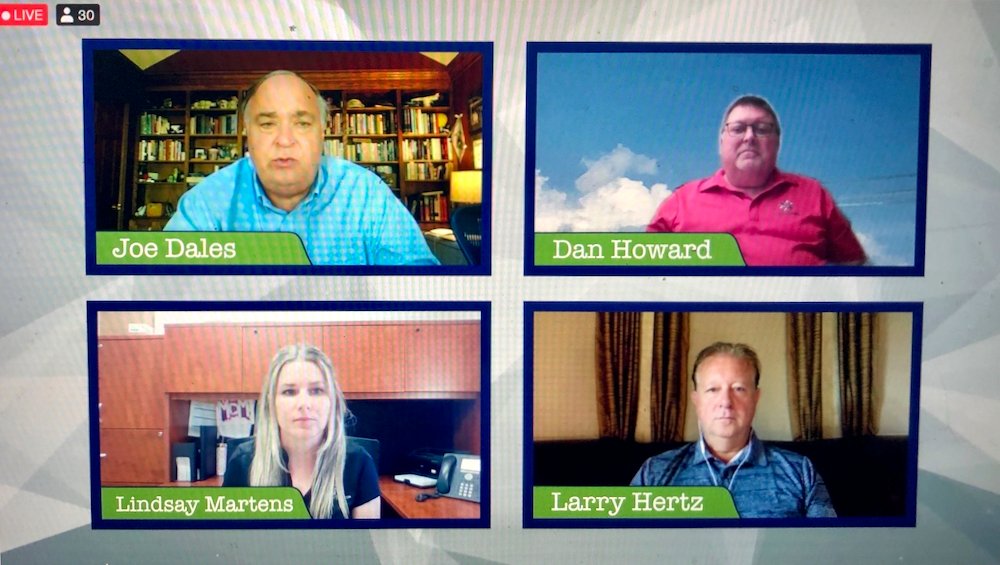It’s not just about the tractor anymore

As farm equipment becomes more high-tech, it is a challenge to find qualified technicians.
That was the consensus of panellists during a discussion at the virtual Changing Faces of Agriculture event hosted by the London Chamber of Commerce and the Western Fair District.
The panel featured Lindsay Marten, human resources manager for Huron Tractor, Dan Howard, supervisor of the School-College-Work Initiative and Ontario Youth Apprenticeship Program programs at Fanshawe College, and Larry Hertz, vice-president of the Western Equipment Dealers Association (WEDA).
Why it matters: A focus on the high-tech sophistication of agricultural equipment could draw youth to the industry and fill future needs for specialized ag equipment technicians.
The three panellists agreed that the key to filling vacancies lies in better informing youths about the diversity of jobs available in the agriculture technology field. That might be attractive to both urban and rural jobseekers and those with work experience in the automotive and trucking industries.
“We have to overcome the perception of it’s not just about the tractor,” said Howard.
A significant part of Howard’s role is liaising between Fanshawe College and six local school boards in the Fanshawe region. He connects high school students with apprenticeship programs in agriculture and works with WEDA and Huron Tractor to do that.
Obtaining skilled technicians is the biggest challenge for Huron Tractor, said Marten. The business is a large John Deere dealership with 11 locations in southwestern Ontario.
It hires apprenticeship trainees through the Fanshawe program, as well as experienced technicians from other sectors, and provides its own in-house training opportunities. But there is still a shortfall.
Part of the challenge, Marten said, is overcoming the “misconception that to work in agriculture you have to be somebody that grew up on a farm to understand the equipment.”
She said she spends a lot of time going to high schools, local colleges and even elementary schools to share the message that agriculture is a large industry.
“And when I talk about the technology involved with farm equipment, their eyes just light up.” Huron Tractor has more than 300 employees and there are many even larger companies that also need help, something many students are surprised to learn.
Job diversity is another little-known element of the business, said Howard. People are needed to repair equipment, but parts technicians and salespeople are needed as well.
And ‘fixing’ equipment isn’t what it used to be either. Hertz said in addition to specialized training, soft skills will also be in demand.
“It’s not the old mechanic or technician that doesn’t leave the shop or who didn’t spend a lot of time with the customer,” he said. “Technicians now interact with customers a lot more in the field, on a mobile service truck, so soft skills are so much important than they ever were before.”
All panelists agreed the real selling point for attracting youth to the industry, particularly those from urban areas, is the sophistication of the technology used in agricultural equipment.
Hertz said the rise in autonomous equipment and future applications of machine learning, artificial intelligence and the Internet of Things is “really exciting now, but it’s going to be more and more exciting as the years go by.”
Compared to the average car that has 20 or 30 onboard computers or sensors, the modern combine has probably got 80 to 100, he said.
“By comparison, they’re just much more of a sophisticated machine.”
Hertz said WEDA sees adequate staffing as a major challenge.
WEDA is an advocacy association of more than 2,000 equipment dealers in the agriculture, industrial, forestry and outdoor sectors. Hertz said feedback from his ag dealer members shows they worry about the growing disconnect between urban and rural, and that engaging urban youth will be important for dealerships.
“They [urban youth] really have no idea how technology focused it is.”
Urban youth rarely get an opportunity to see a dealership. Hertz noted most of WEDA’s members are off the beaten path, and “aren’t going to be seen on the side of the 401.”
That’s why partnerships with Fanshawe College have been beneficial for Huron Tractor and other WEDA members, said Hertz. Members and businesses trying to attract youth into the industry should also focus on career fairs and participate in events that promote skilled trades.
Marten added that it’s also important to make youth aware that the agricultural industry is strong economically.
“The industry isn’t going anywhere. We all need to eat and farms will continue to need to operate.”
Source: Farmtario.com

